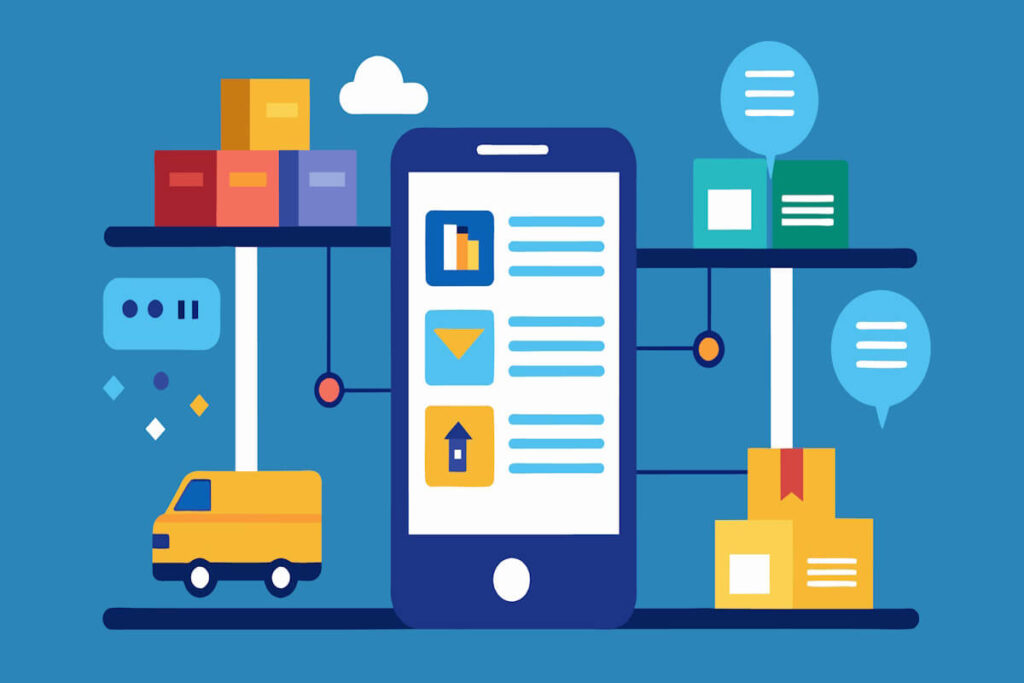In today’s fast-paced world, where customers expect quick and efficient delivery of goods, logistics companies are under constant pressure to streamline their operations and improve efficiency. One key tool that has revolutionized the logistics industry is mobile apps. These apps have become an indispensable part of the logistics ecosystem, helping companies optimize their processes, track shipments in real-time, and enhance overall efficiency.
Real-time Tracking and Visibility
Mobile apps offer real-time tracking capabilities that allow logistics companies to monitor the exact location of their vehicles and shipments at any given time. By utilizing GPS technology, companies can identify potential delays or issues and take proactive measures to address them. This level of transparency benefits customers as well, as they can track the status of their deliveries and receive accurate delivery estimates. The ability to track shipments in real-time enhances operational efficiency and customer satisfaction.
- Real-time tracking ensures accurate delivery estimates
- Helps identify and address potential delays proactively
- Enhances operational efficiency and customer satisfaction
Efficient Route Planning
Optimizing route planning is another significant benefit of mobile apps in logistics. These apps leverage real-time traffic data and GPS technology to suggest the most efficient routes for drivers to follow. By reducing fuel costs and minimizing delivery times, companies can improve customer satisfaction. Furthermore, route optimization helps decrease carbon footprint by minimizing unnecessary mileage and emissions.
- Real-time traffic data helps suggest efficient routes
- Reduces fuel costs and minimizes delivery times
- Improves customer satisfaction and reduces carbon footprint
Inventory Management
Mobile apps enhance logistics efficiency by enabling real-time inventory tracking. Companies can monitor inventory levels to ensure they have the right amount of stock on hand to fulfill orders. This visibility helps prevent stockouts and overstocking, leading to cost savings and operational efficiency. Additionally, mobile apps streamline the order fulfillment process through automated inventory updates and accurate order picking.
- Real-time inventory tracking prevents stockouts and overstocking
- Leads to cost savings and operational efficiency
- Streamlines order fulfillment process through automation
Enhanced Communication and Collaboration
Seamless communication and collaboration are facilitated by mobile apps among all stakeholders in the logistics chain. From drivers and warehouse staff to customers and suppliers, these apps enable instant communication and information sharing. Real-time collaboration helps avoid miscommunications and delays, leading to smoother operations and improved efficiency. Notifications and alerts provided by mobile apps keep all parties informed of changes or updates, enhancing visibility and transparency.
- Facilitates instant communication and information sharing
- Avoids miscommunications and delays
- Enhances visibility and transparency through notifications and alerts
Paperless Workflow
Mobile apps contribute to a paperless workflow in logistics by digitizing tasks such as order processing, invoicing, and proof of delivery. This digitization reduces reliance on manual processes and paperwork, improving accuracy, reducing errors, and speeding up operations. The streamlined workflow saves time and resources, enhances data accuracy and accessibility, and enables electronic signatures and document management, further reducing paperwork.
- Digitizes tasks to reduce reliance on manual processes and paperwork
- Improves accuracy, reduces errors, and speeds up operations
- Enhances data accuracy and accessibility through electronic signatures and document management
Conclusion
In conclusion, mobile apps are essential in enhancing logistics efficiency by providing real-time tracking and visibility, optimizing route planning, streamlining inventory management, facilitating communication and collaboration, and enabling a paperless workflow. Companies that embrace mobile technology will stay ahead of the competition and deliver exceptional service to customers. By leveraging the power of mobile apps, logistics companies can streamline operations, reduce costs, and improve overall efficiency.
Ready to streamline your logistics operations and improve efficiency with a mobile app? Contact us today to discuss your specific needs and explore how we can help you leverage mobile technology to gain a competitive edge.
FAQs:
How do mobile apps enhance logistics efficiency?
Mobile apps help logistics companies optimize processes, track shipments in real-time, and improve overall efficiency by providing real-time visibility, efficient route planning, inventory management, and enhanced communication.
What is the significance of real-time tracking in logistics?
Real-time tracking allows logistics companies to monitor the exact location of vehicles and shipments, identify potential delays or issues, and provide customers with accurate delivery estimates, leading to improved transparency and proactive issue resolution.
How do mobile apps aid in route planning for logistics companies?
Mobile apps optimize route planning by leveraging real-time traffic data and GPS technology to suggest efficient routes for drivers, reducing fuel costs, minimizing delivery times, and enhancing customer satisfaction while also reducing the carbon footprint.
In what way do mobile apps improve inventory management in logistics?
Mobile apps enable real-time tracking of inventory levels, ensuring the right amount of stock is on hand to fulfill orders, preventing stockouts and overstocking, streamlining the order fulfillment process, and automating inventory updates for quick and accurate order picking.
